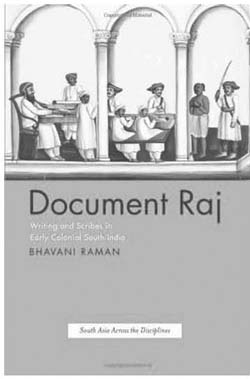The historiography of colonial rule in India has for long been focused on the polarities of coercion and consent. Over the past two decades or so, historians have done much to further our understanding of the admixture of force and collaboration in sustaining colonial domination. More recent works inspired by Foucauldian notions of governmentality have drawn our attention to the workings of colonial power at its point of application. These have underscored the extent to which imperial governance was, in practice, far from being ideologically stable and self-confident, and was actually shot through with uncertainty and panic, hesitancy and contradiction. Bhavani Raman’s study of the making of a new scribal culture under early colonial state in South India takes these debates in a brilliant and original direction. The book’s orientation is not, however, defined solely by the existing historiography: Raman also takes valuable cues from recent anthropological work—by Veena Das and Akhil Gupta, among others—on the everyday bureaucratic state. The result is a study that is at once conceptually acute and empirically rich.
The intrinsic importance of bureaucracy to the British East India Company was evident to contemporaries. Writing in the early 1850s, in the midst of a debate in London about the renewal of the Company’s charter to rule, Marx scathingly observed that the ‘actual governing power’ over India was not the British Parliament or the Company’s directorate, but the Company clerks in Leadenhall, who were ‘transforming the Indian Government into one immense writing machine’. ‘No wonder’, he continued, ‘that there exists no government by which so much is written and so little done.’ Among those who defended the Company in these debates was one of these clerks: John Stuart Mill. Writing down all orders and reporting all official acts, argued Mill, actually ensured good government—one that was accountable to the metropolitan power.
Historians have arrived on this terrain somewhat late. The publication of Edward Said’s Orientalism touched off some debates on the role of native intermediaries in the formation of colonial knowledge and governance. In his Empire and Information, Chris Bayly emphasized the degree to which Indian informants played a critical role in sustaining the information flow of the colonial state as well as the periodic short-circuiting of the system. In a related, elegant formulation, Sudipta Kaviraj envisioned the colonial Leviathan as having native ‘feet of clay’. Others, by contrast, have stressed the centrality of cultural difference in the making of colonial modernity and governance. None, however, has focused as closely as Raman does on the importance and practices of writing to the colonial bureaucracy.

